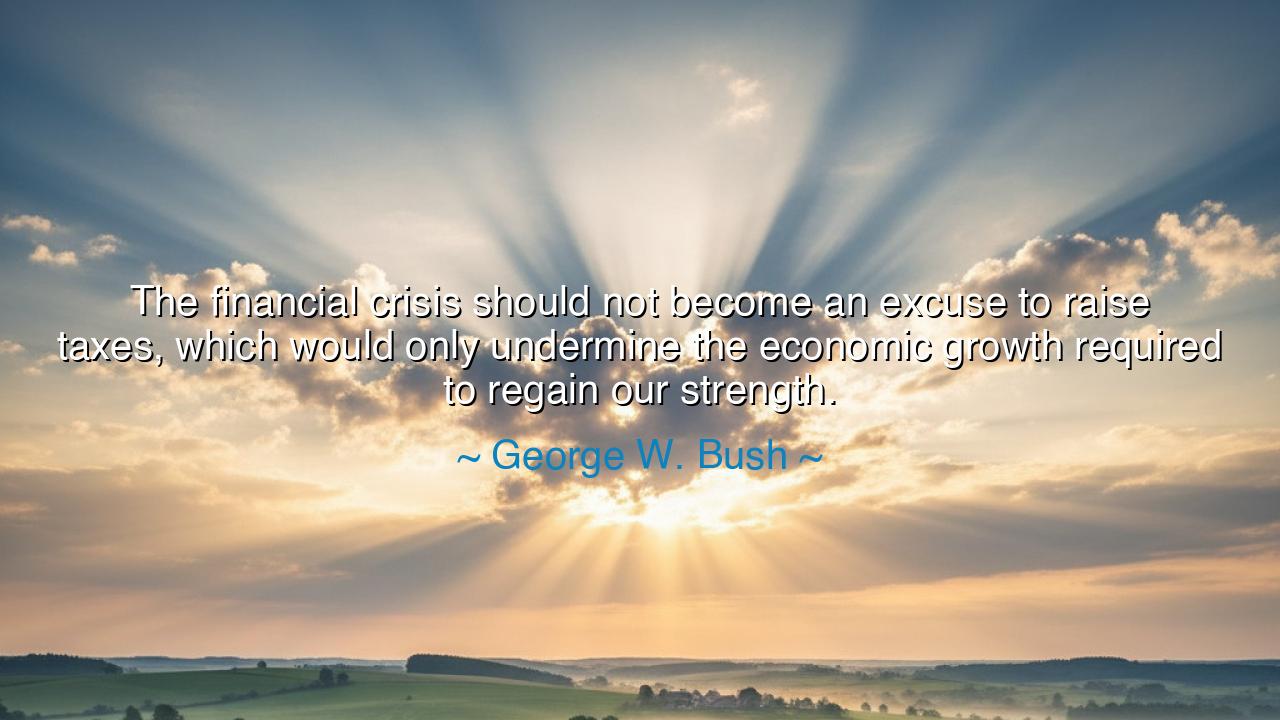
The financial crisis should not become an excuse to raise taxes
The financial crisis should not become an excuse to raise taxes, which would only undermine the economic growth required to regain our strength.






Hear the words of George W. Bush, spoken in a time of turmoil and uncertainty: “The financial crisis should not become an excuse to raise taxes, which would only undermine the economic growth required to regain our strength.” These words came forth in the shadow of the great collapse of 2008, when markets trembled, banks faltered, and the world seemed to totter upon the edge of ruin. They are not merely the words of policy, but of philosophy, a reminder of how nations must balance survival and growth when hardship strikes.
When Bush speaks of a financial crisis, he acknowledges the storms that assail nations, storms as fierce as those that once sank empires. In such times, rulers are tempted to bind the wounds with heavy burdens placed upon the people—taxes that sap the very breath from labor and enterprise. Yet Bush warns that this path, though it may promise short-term relief, risks destroying the foundation upon which recovery must be built. For true recovery is not found in tightening chains, but in freeing the spirit of innovation and work.
The heart of his teaching is that economic growth is itself the medicine for crisis. A weary nation cannot regain its strength by punishing the labor of its people, but by encouraging it, by giving space for the soil of industry to bear fruit once more. To raise taxes in the hour of weakness, he argues, is like demanding greater harvest from barren fields. It is not discipline that saves in such a moment, but renewal—growth that multiplies, energy that restores.
History itself gives witness to this truth. In the years after the Great Depression, nations that sought only to tighten the belt of taxation without fostering growth languished in despair. But those who invested in their people, who opened roads, built industries, and allowed the worker to breathe, rose again. The United States, through the New Deal and the industrial surge of World War II, found strength not through burdening its citizens but by calling forth their creativity and productivity. The lesson, repeated across time, is that recovery is born of freedom and growth, not of suffocation.
Yet Bush’s words also carry a warning against excuses. For in times of crisis, leaders often cloak their ambitions in necessity. The danger is not merely the burden of taxes, but the precedent of using hardship as justification for overreach. When crisis becomes a mask for excess, liberty itself weakens, and with it the long-term strength of a people. Thus, his wisdom is not only economic but civic: a nation must beware of trading away its vitality under the guise of safety.
The meaning, then, is not to despise taxation altogether, for taxes in their rightful measure build the roads, guard the borders, and sustain the common good. Rather, the teaching is that timing and measure are everything. In the hour of plenty, taxes may be borne with lighter spirit. But in the hour of trial, restraint is wisdom, for it allows the people to rise again before they are called upon to give. Just as a wounded warrior must first regain his footing before bearing new burdens, so must a nation recover its breath before being pressed further.
The lesson for us is clear: whether in nations, families, or personal lives, do not respond to crisis by adding heavier chains. Instead, focus on renewal—on creating growth, fostering opportunity, and regaining vitality. Support one another not by draining, but by encouraging. And when recovery comes, then share the weight more justly.
Practical actions are these: in your own life, when hardship strikes, do not burden yourself with unnecessary obligations. First rebuild your strength, cultivate the soil of your mind, and restore your energy. Then, when you are strong again, you may bear greater responsibility. For this principle applies not only to economies, but to all human endeavor.
So let Bush’s words be remembered: “The financial crisis should not become an excuse to raise taxes, which would only undermine the economic growth required to regain our strength.” A nation, like a man, must not strangle itself in its weakest hour, but must nurture growth, courage, and creativity. From that growth comes renewal, and from renewal comes the strength to carry both the burdens and the glories of the future.






AAdministratorAdministrator
Welcome, honored guests. Please leave a comment, we will respond soon